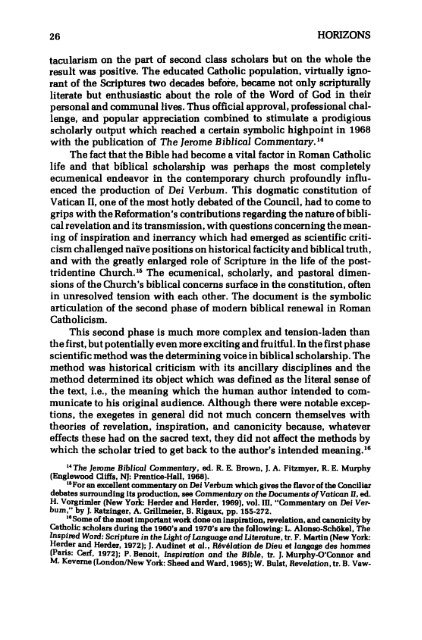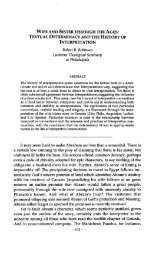FROM EXEGESIS TO HERMENEUTICS - Rice School of Pastoral ...
FROM EXEGESIS TO HERMENEUTICS - Rice School of Pastoral ...
FROM EXEGESIS TO HERMENEUTICS - Rice School of Pastoral ...
You also want an ePaper? Increase the reach of your titles
YUMPU automatically turns print PDFs into web optimized ePapers that Google loves.
26 HORIZONStacularism on the part <strong>of</strong> second class scholars but on the whole theresult was positive. The educated Catholic population, virtually ignorant<strong>of</strong> the Scriptures two decades before, became not only scripturallyliterate but enthusiastic about the role <strong>of</strong> the Word <strong>of</strong> God in theirpersonal and communal lives. Thus <strong>of</strong>ficial approval, pr<strong>of</strong>essional challenge,and popular appreciation combined to stimulate a prodigiousscholarly output which reached a certain symbolic highpoint in 1968with the publication <strong>of</strong> The Jerome Biblical Commentary. 14The fact that the Bible had become a vital factor in Roman Catholiclife and that biblical scholarship was perhaps the most completelyecumenical endeavor in the contemporary church pr<strong>of</strong>oundly influencedthe production <strong>of</strong> Dei Verbum. This dogmatic constitution <strong>of</strong>Vatican II, one <strong>of</strong> the most hotly debated <strong>of</strong> the Council, had to come togrips with the Reformation's contributions regarding the nature <strong>of</strong> biblicalrevelation and its transmission, with questions concerning the meaning<strong>of</strong> inspiration and inerrancy which had emerged as scientific criticismchallenged naïve positions on historical facticity and biblical truth,and with the greatly enlarged role <strong>of</strong> Scripture in the life <strong>of</strong> the posttridentineChurch. 15 The ecumenical, scholarly, and pastoral dimensions<strong>of</strong> the Church's biblical concerns surface in the constitution, <strong>of</strong>tenin unresolved tension with each other. The document is the symbolicarticulation <strong>of</strong> the second phase <strong>of</strong> modern biblical renewal in RomanCatholicism.This second phase is much more complex and tension-laden thanthe first, but potentially even more exciting and fruitful. In the first phasescientific method was the determining voice in biblical scholarship. Themethod was historical criticism with its ancillary disciplines and themethod determined its object which was defined as the literal sense <strong>of</strong>the text, i.e., the meaning which the human author intended to communicateto his original audience. Although there were notable exceptions,the exegetes in general did not much concern themselves withtheories <strong>of</strong> revelation, inspiration, and canonicity because, whatevereffects these had on the sacred text, they did not affect the methods bywhich the scholar tried tò get back to the author's intended meaning. 1614 The Jerome Biblical Commentary, ed. R. E. Brown, J. A. Fitzmyer, R. E. Murphy(Englewood Cliffs, NJ: Prentice-Hall, 1968).15 For an excellent commentary on Dei Verbum which gives the flavor <strong>of</strong> the Conciliardebates surrounding its production, see Commentary on the Documents <strong>of</strong> Vatican II, ed.H. Vorgrimler (New York: Herder and Herder, 1969), vol. ΙΠ, "Commentary on Dei Verbum,"by J. Ratzinger, A. Grillmeier, B. Rigaux, pp. 155-272.16Some <strong>of</strong> the most important work done on inspiration, revelation, and canonicity byCatholic scholars during the 1960's and 1970's are the following: L. Alonso-Schökel, TheInspired Word: Scripture in the Light <strong>of</strong> Language and Literature, tr. F. Martin (New York:Herder and Herder, 1972); J. Audinet et al., Révélation de Dieu et langage des hommes(Paris: Cerf, 1972); P. Benoit, inspiration and the Bible, tr. J. Murphy-O'Connor andM. Keveme (London/New York: Sheed and Ward, 1965); W. Bulst, Revelation, tr. B. Vaw-



